OCZ Agility 3 (240GB) Review
by Anand Lal Shimpi on May 24, 2011 2:53 AM ESTAnandTech Storage Bench 2011
I didn't expect to have to debut this so soon, but I've been working on updated benchmarks for 2011. Last year we introduced our AnandTech Storage Bench, a suite of benchmarks that took traces of real OS/application usage and played them back in a repeatable manner. I assembled the traces myself out of frustration with the majority of what we have today in terms of SSD benchmarks.
Although the AnandTech Storage Bench tests did a good job of characterizing SSD performance, they weren't stressful enough. All of the tests performed less than 10GB of reads/writes and typically involved only 4GB of writes specifically. That's not even enough exceed the spare area on most SSDs. Most canned SSD benchmarks don't even come close to writing a single gigabyte of data, but that doesn't mean that simply writing 4GB is acceptable.
Originally I kept the benchmarks short enough that they wouldn't be a burden to run (~30 minutes) but long enough that they were representative of what a power user might do with their system.
Not too long ago I tweeted that I had created what I referred to as the Mother of All SSD Benchmarks (MOASB). Rather than only writing 4GB of data to the drive, this benchmark writes 106.32GB. It's the load you'd put on a drive after nearly two weeks of constant usage. And it takes a *long* time to run.
I'll be sharing the full details of the benchmark in some upcoming SSD articles but here are some details:
1) The MOASB, officially called AnandTech Storage Bench 2011 - Heavy Workload, mainly focuses on the times when your I/O activity is the highest. There is a lot of downloading and application installing that happens during the course of this test. My thinking was that it's during application installs, file copies, downloading and multitasking with all of this that you can really notice performance differences between drives.
2) I tried to cover as many bases as possible with the software I incorporated into this test. There's a lot of photo editing in Photoshop, HTML editing in Dreamweaver, web browsing, game playing/level loading (Starcraft II & WoW are both a part of the test) as well as general use stuff (application installing, virus scanning). I included a large amount of email downloading, document creation and editing as well. To top it all off I even use Visual Studio 2008 to build Chromium during the test.
Update: As promised, some more details about our Heavy Workload for 2011.
The test has 2,168,893 read operations and 1,783,447 write operations. The IO breakdown is as follows:
| AnandTech Storage Bench 2011 - Heavy Workload IO Breakdown | ||||
| IO Size | % of Total | |||
| 4KB | 28% | |||
| 16KB | 10% | |||
| 32KB | 10% | |||
| 64KB | 4% | |||
Only 42% of all operations are sequential, the rest range from pseudo to fully random (with most falling in the pseudo-random category). Average queue depth is 4.625 IOs, with 59% of operations taking place in an IO queue of 1.
Many of you have asked for a better way to really characterize performance. Simply looking at IOPS doesn't really say much. As a result I'm going to be presenting Storage Bench 2011 data in a slightly different way. We'll have performance represented as Average MB/s, with higher numbers being better. At the same time I'll be reporting how long the SSD was busy while running this test. These disk busy graphs will show you exactly how much time was shaved off by using a faster drive vs. a slower one during the course of this test. Finally, I will also break out performance into reads, writes and combined. The reason I do this is to help balance out the fact that this test is unusually write intensive, which can often hide the benefits of a drive with good read performance.
There's also a new light workload for 2011. This is a far more reasonable, typical every day use case benchmark. Lots of web browsing, photo editing (but with a greater focus on photo consumption), video playback as well as some application installs and gaming. This test isn't nearly as write intensive as the MOASB but it's still multiple times more write intensive than what we were running last year.
As always I don't believe that these two benchmarks alone are enough to characterize the performance of a drive, but hopefully along with the rest of our tests they will help provide a better idea.
The testbed for Storage Bench 2011 has changed as well. We're now using a Sandy Bridge platform with full 6Gbps support for these tests. All of the older tests are still run on our X58 platform.
AnandTech Storage Bench 2011 - Heavy Workload
We'll start out by looking at average data rate throughout our new heavy workload test:
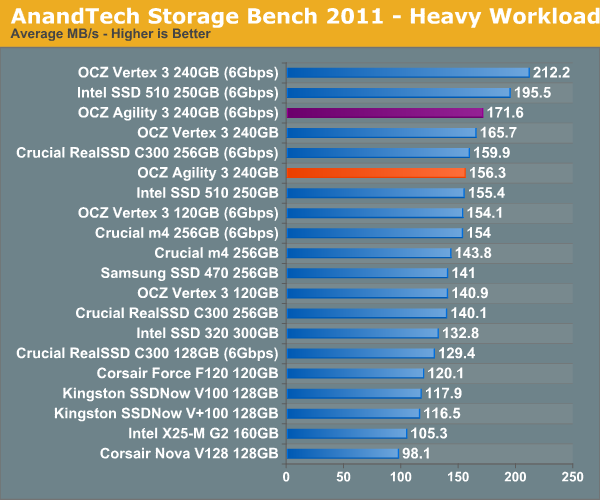
Our heavy workload has quite a bit of compressed reads/writes, which are where the Agility 3 is going to struggle the most. The 240GB Agility 3 performs more like an Intel SSD 510 here rather than a Vertex 3. The Agility 3 is still a respectable performer, definitely faster than the old Vertex 2, but it's definitely not as quick as the new Vertex 3.
The breakdown of reads vs. writes tells us more of what's going on:
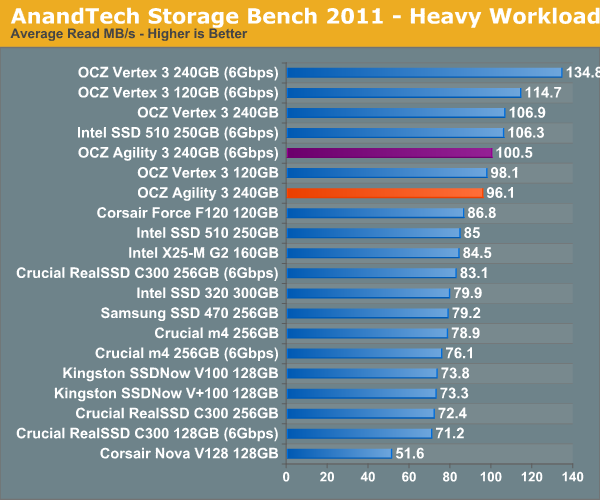
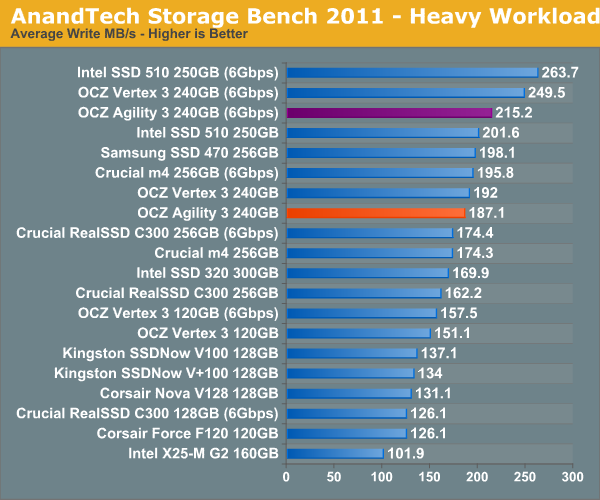
The next three charts just represent the same data, but in a different manner. Instead of looking at average data rate, we're looking at how long the disk was busy for during this entire test. Note that disk busy time excludes any and all idles, this is just how long the SSD was busy doing something:
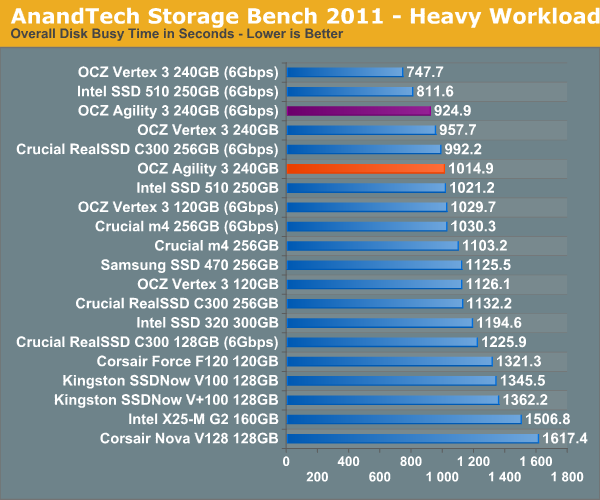
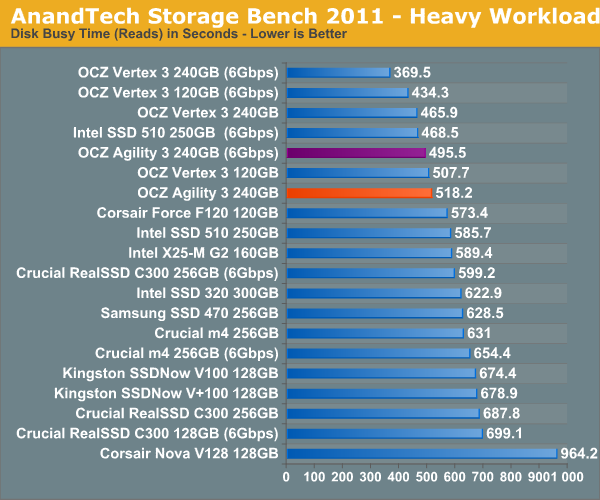
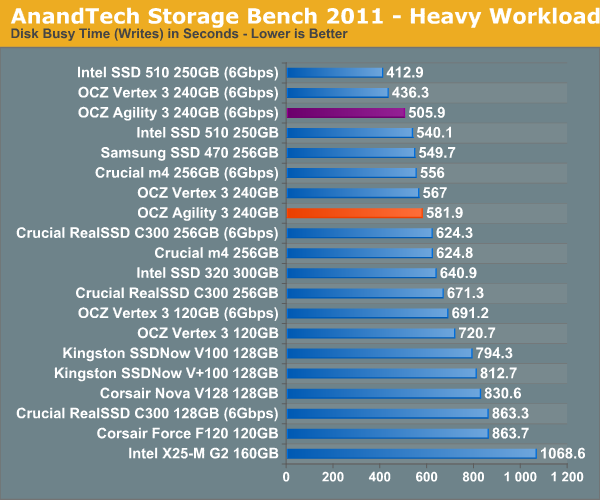










59 Comments
View All Comments
Nicolas Pillot - Friday, May 27, 2011 - link
Seeing Vertex 2 120G and Agility 3 120G at the same price, which one should i buy ?BTW : no sata 3 motherboard at the moment, so choice shouldn't be based on it.
DanaG - Wednesday, June 1, 2011 - link
I sure hope the Agility/Vertex 3 drives are more reliable than the Vertex 2 is. I had one fail two weeks ago, and then the replacement I got last Wednesday failed on Saturday. I believe it happened when we had a momentary interruption in power. The laptop and secondary-bay HDD are fine, and the drive kept working until I shut it down; once I did so, the drive became totally unresponsive.The drives also can't handle ATA Password properly:
http://www.ocztechnologyforum.com/forum/showthread...
From the forums and Newegg's reviews, it looks like plenty of other people have similar issues. For comparison, I've had zero issues with my old Indilinx drive. I like the performance of the Vertex 2, but I don't feel confident in the reliability of any Sandforce drives now.
Anand, can you please talk to the OCZ people about these sorts of things?
cactusjuggler - Wednesday, June 1, 2011 - link
Firstly, I really appreciate AT's in depth reviews. That said, I absolutely agree with DanaG, and I don't see reviews addressing the reliability of these drives--particularly SandForce ones.I'm pricing out two new computers at the moment, and have been surveying the SSD landscape. If I made a buying decision purely on this review and others that focus on performance I'd already have ordered a Vertex 2 or the like, but after reading enough about failed drives, there's no way I'm buying anything with a SandForce controller for a good long time.
Based on the sheer number of anecdotes I'm seeing I find it odd that reviews aren't even mentioning the issue of reliability. 6 out of 10 of the most recent comments on Newegg for the OCZ Agility 2 are complaining about outright failure (in some cases replaced drives also failed), or major problems using the drive.
That sort of track record is embarrassing in a retail product, and really makes me wary about the reliability of the technology overall. Compounded with the apparent fact that data on a bricked drive is irretrievable in many (the majority?) of cases, and you really have to think twice about using one.
Given all this it's kind of amazing, and downright laughable, that some of these drives are supposedly targeted at enterprise level customers.
rajeanand - Wednesday, June 1, 2011 - link
For all those looking for a Corsair Force 3 review, the first on is now online: http://www.kitguru.net/components/ssd-drives/zardo...Seems performance is very similar to the Agility3 reviewed in this article, although the Force 3 reviewed in the article is a 120GB
curiousincal - Friday, December 2, 2011 - link
Can tell me the preconditioning for the random read test and the preconditioning for the random write test used here?Thanks,
johan008 - Thursday, January 26, 2012 - link
Mine died after 4 months. OCZ used "unauthorized reseller or warranty not transferable" to stop all the claims. I was problem ticket no: 240 526 and it keep rising fast. See OCZ discussion forum before you buy as these SSD from OCZ are still very unstable.jdtwoseven - Wednesday, August 1, 2012 - link
I've had three OCZ SSD products, including one of these Agility 3 240 gb SSDs, and I've ended up having to RMA each one of them. That is a terrible record of reliability for the drives. The amount of time that it took to get a replacement was also painfully slow. Not good. Buy a Crucial M4, which is what I did while I was waiting. The Crucial M4 is fast, and I've had no problems at all.ByronArneson - Friday, October 7, 2016 - link
Thank you for perhaps the most level headed thing I have read today. I also can share my experience in filling forms. I've found PDFfiller - online service for forms filling. It's pretty easy to use and pretty cheap. You can find fillable a form here "https://goo.gl/yPbFZS".davodamirajam - Monday, January 29, 2018 - link
im l74 is old but very best and have 24bit eccnow is so many ssd hynix 72bit ecc tlc 16k ,after use tlc in ssd good buy quality
i make flash with 29f16b08ccme2 *2 sinle channel ps2307 read is 113 write is 50
i make with 98 de 94 93 76 d7 * mlc ts 19nm type c 16k 100 read 200
but is ecc toshiba 19,a19 44bit ecc low time cycle forread and write
in last i love im l63b ,and l74
some ssd and l63b now is 10 years old but is a live
but after 4 years see ts a19nm